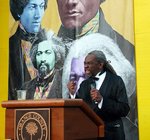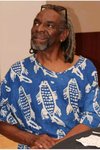 Narrowsburg
NarrowsburgLight Rain Fog/Mist, 43°
Wind: 8.1 mph
 Narrowsburg
NarrowsburgBlack History Month is an annual celebration of achievements by Black Americans and a time for recognizing their central role in U.S. history. Also known as African American History Month, the event …
Stay informed about your community and support local independent journalism.
Subscribe to The River Reporter today. click here
This item is available in full to subscribers.
Please log in to continue |


Black History Month is an annual celebration of achievements by Black Americans and a time for recognizing their central role in U.S. history. Also known as African American History Month, the event grew out of “Negro History Week,” the brainchild of noted historian Carter G. Woodson and other prominent Black Americans. Since 1976, every U.S. president has officially designated the month of February as Black History Month (www.history.com).
I had a virtual sit-down with writer, actor and orator G. Oliver King last week to discuss the importance of bringing Black History to life for future generations and his role in that endeavor.
Jonathan Charles Fox: I know that, in the past, you’ve expressed your passion for the life and times of Frederick Douglass, who was influential in the abolition of slavery. He wrote several books about the subject between 1845 and 1855. In fact, you have performed as Douglass in libraries for educational institutions, museums and in schools, right?
Oliver King: Right. My life-long interest in Douglass and Martin Luther King, among others, began back in high school when I joined the debate club and began doing... oral interpretations of King’s amazing writings. After developing an interest in acting, I became involved with many productions as a performer, dancer and choreographer, and I have worked with some amazing people and theatres over the years, both in New York City and in Hollywood, for a while.
JCF: Are you from the region originally?
GOK: No. I was born in Harlem. My family moved to Queens, NY and then eventually relocated to Sullivan County in 1990, where my mom opened a bed and breakfast [B&B]. By then, I was in Los Angeles but would visit at least once a year. When I decided to leave the Hollywood scene, I chose to relocate and help my mom with the B&B here in the Catskills.
JCF: How did that lead to you performing as Frederick Douglass?
GOK: After moving to Sullivan County, I discovered an organization called the Association for the Study of African American Life and History [ASALH]. They would hold annual breakfasts named for Douglass, but there was no actual focus on the man himself. I proposed speaking about him and did so at the next ASALH event. That was the first time I did an oral interpretation of one of his speeches.
JCF: How did that go over?
GOK: The response was very positive and served as my introduction to the community as an actor. I then became involved with the Sullivan County Dramatic Workshop and the Delaware Valley Opera Company, aside from my continued appearances as Douglass. I also produced and directed Sullivan County’s first all African-American production of an “upgraded” version of playwright Larraine Hansberry’s “A Raisin in the Sun.”
JCF: Let’s fast-forward to the present and your involvement with the Hurleyville Performing Arts Centre (HPAC). I understand this is a departure for you in that you’re reading James Baldwin’s “The Fire Next Time” in celebration of Black History Month.
GOK: Correct. We’ve recorded it in their brand new high-tech theatre and it is being broadcasted throughout the month of February. Executive Director Erin Dudley is amazing, and the entire team at HPAC was eager to bring me on board for this unique program. Technical Director Michael Coney is a genius and, through the use of projections, was able to bring James Baldwin’s book to life in an empty theatre.
JCF: So, you perform the book as Baldwin?
GOK: No, it’s not a “performance.” It’s an event—an actual reading of the 50-page book broken up into six segments, each about 30 minutes long. As for “an empty theatre,” it’s true that there was no audience [due to COVID-19 restrictions], but in my mind, I was reading to my nephew.
JCF: Why do you think we need a special month designated for Black history?
GOK: Because in this country, people still seem reticent to admit to all of the injustices that have been perpetrated on the African-American community. Slavery wasn’t like Europeans emigrating to this country and happy to be here. My ancestors were dragged here in chains. When we consider Black History Month, we think about that struggle. Lincoln did a great thing issuing the Emancipation Proclamation, but he left one thing out: Slaves were freed, but free to do what? They had no resources with which to make a life, no education, no property, many had nowhere to go and they stayed on the plantations. Many atrocities occurred during slavery, but after that, it was worse. That legacy has been passed down from generation to generation, and it’s important that all people are aware of what happened then and how it affects us all to this day.
Note: “The Fire Next Time” was written in the form of two letters first published in 1963 on the occasion of the centennial of the Emancipation Proclamation that exhorts Americans, both Black and white, to attack the terrible legacy of racism.
To view G. Oliver King’s reading of James Baldwin’s book, as well as other HPAC programs, go to www.hurleyvilleartscentre.org.
Comments
No comments on this item Please log in to comment by clicking here